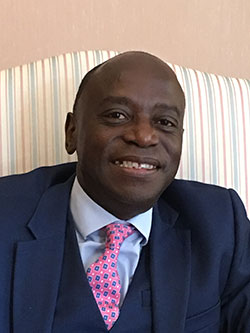Prioritizing research training and medical education in Africa: Q and A with Dr Jean Nachega
January / February 2020 | Volume 19, Number 1

Jean Nachega, MD, PHD, MPH
With more than 25 years of HIV/AIDS research experience, Dr. Jean Nachega was a principal investigator (PI) on the $130 million
Medical Education Partnership Initiative (MEPI), which was managed by Fogarty and funded by NIH and the President’s Emergency Plan for AIDS Relief (PEPFAR). Nachega holds faculty positions at the University of Pittsburgh and Stellenbosch University in Cape Town, South Africa, and is an adjunct professor at Johns Hopkins University. He is now PI on the
African Association for Health Professions Education and Research award, which supports AFREhealth, the leadership and convening organization intended to continue and strengthen the MEPI network. Nachega is also a member-elect of the South African Academy of Sciences (MASSAf) and a fellow of the African Academy of Sciences (FAAS).
What has MEPI’s impact been?
MEPI was really a game changer. This was the first large program to award funds directly to African institutions. At Stellenbosch University, the MEPI team was able to strengthen our medical school curricula and increase the number of graduates in rural and remote locations where they were needed most. By establishing training programs in these underserved areas, we could recruit locally, which improved retention of trainees who would practice at home and give back to their local communities. MEPI was transformative not only for its ability to provide medical education to remote locations using innovative methods such as distance-learning tools and hands on information technology, but also because it offered opportunities to conduct local research so trainees didn’t feel they were missing out. This was a great outcome and provided a fantastic return for their communities.
MEPI also provided a great opportunity to strengthen North-South partnerships, in collaboration with U.S. institutions. Even more important were the South-South relationships that formed. MEPI helped us look for new ways to share resources, establish a community of practice, and, innovatively, learn from those from diverse health profession backgrounds. Prior to MEPI, we had not had a tradition of partnership among medical schools in the South, but we now routinely work together to write grants and collaborate on many activities. That legacy lives on and is being scaled up in AFREhealth.
What are AFREhealth’s goals?
AFREhealth is a pan-African initiative that is the child of MEPI. Just as when you give birth to a child you must nourish it to make sure it can grow and flourish, AFREhealth is a network of institutions that aims to work together to continue to strengthen medical education and research. Our challenge is to leverage the MEPI investments to continue to make progress. We are bringing together and embracing all health professionals - not just doctors and nurses - but also pharmacists, dentists, lab scientists, community health workers, and others from allied health sciences. We hope to create a vibrant research environment and together tackle pressing research questions. As we are concerned about funding sustainability, we will be writing grant proposals to submit to NIH and other public and private organizations, as well as engaging with the African Union and governments throughout sub-Saharan Africa. We hope in the next 5 to 10 years that AFREhealth will have multiple stakeholders and supporters.
How are you building a knowledge base?
One thing we are doing is sharing our lessons learned. Fogarty’s Center for Global Health Studies has convened the community to consider
best practices from our HIV/AIDS treatment and prevention programs. One size does not fit all, but through an implementation science approach, we are studying what interventions are the most cost-effective and have the most impact in real-life practice. We are also exploring how to use the HIV care platform to better manage such chronic conditions.
What are your research priorities?
Now that we are able to keep people alive longer with antiretroviral therapy (ART), we need to focus on the comorbidities and chronic diseases that occur with aging. We must conduct multi-disciplinary research to tackle the noncommunicable diseases (NCDs), which are now killing more people than AIDS, while building a new generation of African scientists to address the HIV NCDs epidemic in low- and middle-income countries (LMICs).
Cardiovascular disease and cancer have high mortality rates in Africa, especially among those living with HIV. We have discovered that even if the virus is suppressed with ART, there are higher than normal levels of ongoing inflammation that impact the heart, kidneys and other organs. Initially, we didn’t appreciate the enormity of this problem. We would like to better understand hypertension and stroke, both of which are prevalent in Africa. We don’t fully understand the mechanisms, but we have seen that people of African descent are highly affected by salt intake that leads to high blood pressure.
We do know that genetics play a significant role in NCDs as it has been shown that gene polymorphism on chromosome 22 is a risk factor for HIV associated kidney disease in patients of African descent. We need to work in partnership with the NIH-funded
Human Heredity and Health in Africa (H3Africa) initiative to better understand these links. We don’t want to overlap; we want to share resources and partner in training and research to capitalize on existing HIV care platforms in LMICs.
More Information
To view Adobe PDF files,
download current, free accessible plug-ins from Adobe's website.